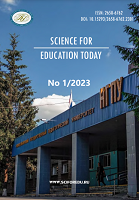Исследование результативности программ профессионального обучения школьников: образовательные, карьерные и миграционные стратегии
The effectiveness of vocational training programs for schoolchildren: Educational, career and migration strategies
Author(s): Anara Zh. TelyubaevaSubject(s): School education, Vocational Education, State/Government and Education, Migration Studies, Sociology of Education
Published by: Новосибирский государственный педагогический университет
Keywords: Vocational training of schoolchildren; Effectiveness of vocational training; Educational strategies; Migration strategies; Career strategies;
Summary/Abstract: Introduction. The article focuses on the programs for integration of education, science and production, which have a positive impact on the economy of the regions and social processes. One of the programs for integrating science, education and production is the vocational training program for schoolchildren, the effectiveness of which is insufficiently studied. The purpose of the article is to examine the effectiveness of vocational training programs for schoolchildren from the perspective of implementing educational, career and migration strategies. Materials and Methods. The review of the implemented vocational training programs for schoolchildren of the Chelyabinsk region was carried out by analyzing legal, economic and statistical data, reports and accounts. The study of the effectiveness of vocational training programs for schoolchildren is based on the analysis of career, migration and educational strategies of students identified through the use of a qualitative research method (a survey). Data processing was conducted using analysis, generalization, comparison, graphical interpretation, and verification. Results. The study shows that scholarly literature lacks unified approaches to assessing the effectiveness of vocational training programs for schoolchildren. Based on the data describing the implementation of vocational training programs for schoolchildren of the Chelyabinsk region, the authors have analyzed the following components within their structure: directions, technologies, mechanisms of organization, learning tools, forms of interaction with organizations of vocational education and production. The survey has revealed that vocational training programs in schools in the Chelyabinsk region contribute to solving the problems of supplementary education, student employment, and professional trials, but do not affect the migration and career attitudes of students. The results of the survey suggest a weak correlation between vocational training programs and career, educational and migration attitudes of students. Conclusions. The article concludes that vocational training programs not only aim to train employees for the region, but also fulfill the function of professional self-determination and social education
Journal: Science for Education Today
- Issue Year: 13/2023
- Issue No: 1
- Page Range: 108-133
- Page Count: 26
- Language: Russian

